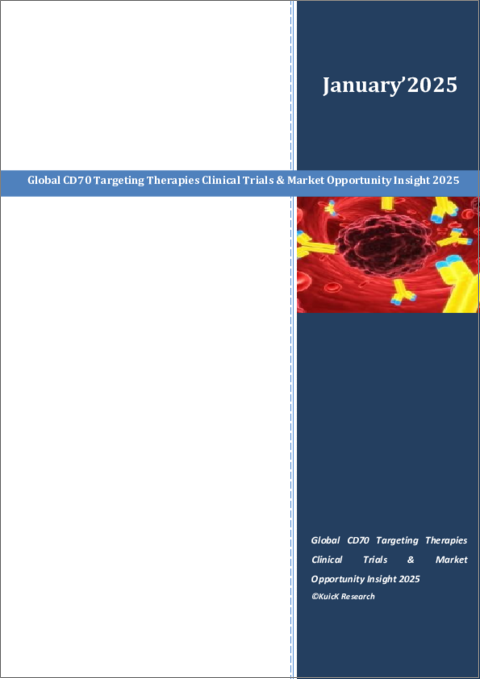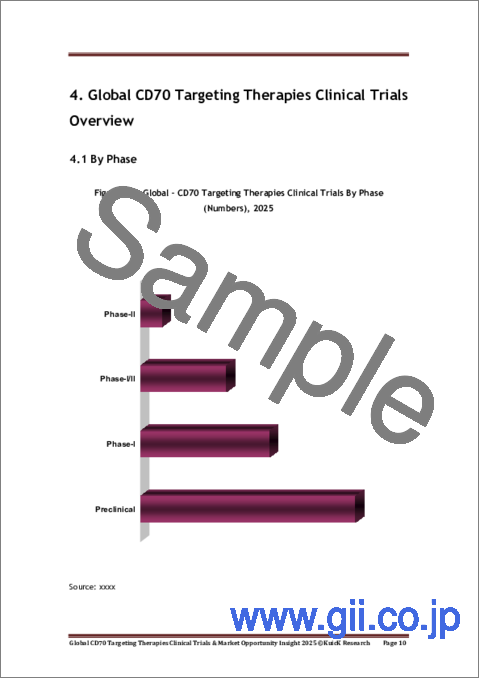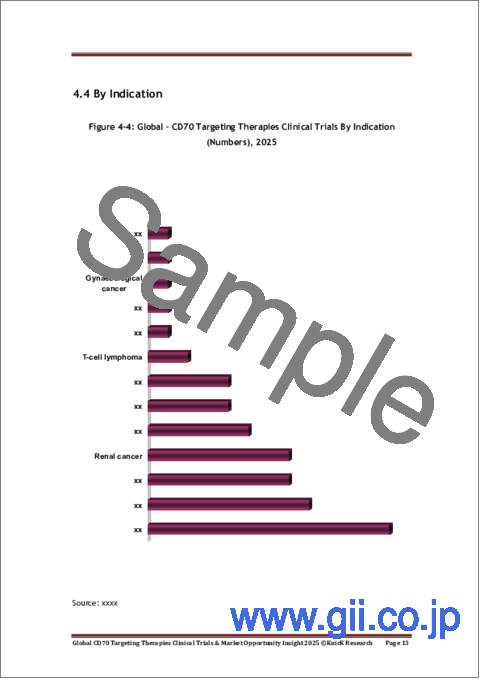|
|
市場調査レポート
商品コード
1643946
CD70標的治療薬の世界市場:臨床試験と市場の機会(2025年)Global CD70 Targeting Therapies Clinical Trials & Market Opportunity Insight 2025 |
||||||
|
|||||||
| CD70標的治療薬の世界市場:臨床試験と市場の機会(2025年) |
|
出版日: 2025年01月01日
発行: KuicK Research
ページ情報: 英文 150 Pages
納期: 即日から翌営業日
|
全表示
- 概要
- 図表
- 目次
CD70標的治療薬は、様々ながんや免疫関連疾患の治療における有望な戦略として急速に認知されつつあり、治療の展望を大きく変えつつあります。細胞表面蛋白質であるCD70は、免疫系の制御に極めて重要であり、健康な組織を温存しながら病変細胞を選択的に攻撃するようにデザインされた治療法の最適な標的となっています。この精密医療への動きは、化学療法や放射線療法といった従来の治療がしばしば重篤な副作用や限られた効果しかもたらさない腫瘍学において特に重要です。
臨床において、CD70標的治療薬は血液悪性腫瘍、特に急性骨髄性白血病(AML)や腎細胞がん(RCC)のような固形がんの治療において大きな可能性を示しています。急性骨髄性白血病は、特に集中的化学療法が適さない患者において、標準的治療で管理することが困難です。CD70標的治療薬に焦点を当てた臨床試験は、この問題に対処する上で有望であり、モノクローナル抗体や人工細胞療法は、治療の選択肢が少ない患者に新たな希望を与えています。現在臨床開発中の最先端のCD70標的治療薬は、Argenxが創製したクサツズマブで、AML患者を対象に化学療法剤と併用する第2相試験が進行中です。この併用戦略では、耐性メカニズムに対処することでクサツズマブの有効性を高め、患者全体の転帰を改善しようとしています。
CD70標的治療の応用はがん治療にとどまらないです。これらの治療法は自己免疫疾患、ウイルス感染症、移植片対宿主病(GvHD)に対しても研究されていますが、まだ研究の初期段階です。免疫応答が機能不全に陥っているこれらの状況において、CD70標的薬は免疫系を調節し、正常な免疫機能を回復させる可能性を秘めています。治療用途の拡大は、これらの治療法の潜在的な市場を拡大するため、この分野への関心を著しく高めます。
中国は、世界のCD70標的治療薬において重要な競合国として台頭してきています。同国の急成長するバイオテクノロジー部門は、国際企業への投資や提携の増加によって強化され、革新的な治療法の迅速な進歩を可能にしています。中国の研究機関は臨床試験への関与を強めており、地元のバイオテクノロジー企業はCD70標的治療薬の商業化に向けて前進しています。
CD70標的治療市場内の競争激化は技術革新を促進し、Allogene Therapeutics、Seagen(Pfizer)、CRISPR Therapeuticsなど複数の企業が新規治療法を開発しています。これらの企業は、治療の安全性と有効性を評価するために包括的な前臨床および臨床研究に取り組んでおり、CD70標的治療の可能性を高めています。より多くの治療法が臨床試験に入り、良好な結果が得られるにつれて、CD70標的治療の商業的機会は拡大しています。
当レポートは、世界のCD70標的治療薬市場について調査し、市場の概要とともに、薬剤動向、臨床試験動向、地域別動向、および市場に参入する企業の競合情勢などを提供しています。
目次
第1章 CD70標的治療薬のイントロダクション
第2章 CD70を標的とした治療法
- モノクローナル抗体
- 二重特異性抗体
- 四特異性抗体
- CAR T細胞療法
- 抗体薬物複合体
- CAR-NK療法
第3章 CD70標的治療薬の臨床研究開発
- 白血病
- リンパ腫
- 婦人科がん
- 腎細胞がん
- 肺がん
- 自己免疫疾患と炎症性疾患
- ウイルス感染
第4章 世界のCD70標的治療薬臨床試験の概要
- 相別
- 国別
- 企業別
- 適応症別
- 優先度別
- 患者セグメント
第5章 CD70標的治療薬の規制指定:ファストトラックと希少疾病用医薬品の指定
第6章 世界CD70標的治療薬臨床試験の洞察
- 前臨床
- 第I相
- 第I/II相
- 第II相
第7章 CD70標的治療薬開発プラットフォーム(企業別・技術別)
- AlloCAR Tプラットフォーム
- ガンマデルタ細胞プラットフォーム
- テイルウィンドプラットフォーム
- DARPinプラットフォーム
- SIMPLE抗体プラットフォーム
- ポテリジェントテクノロジー
- 既製の同種異系製造
第8章 世界のCD70標的治療薬の現在の市場動向と開発
- 現在の市場の概略
- 今後の市場予測
第9章 CD70標的治療薬の市場機会と地域別の臨床動向
- 米国
- 中国
- 欧州
第10章 CD70標的治療薬の併用戦略
- 免疫療法との併用
- エピジェネティックモジュレーターとの併用
- 標的療法との併用
- 腫瘍溶解性ウイルス療法との併用
- 化学療法との併用
第11章 世界のCD70標的治療市場力学
- 市場の促進要因
- 市場の課題
第12章 競合情勢
- Adaptimmune
- Adicet Bio
- Allogene Therapeutics
- Ambrx (Johnson & Johnson)
- Chongqing Precision Biotech
- Chinook Therapeutics (Novartis)
- CRISPR Therapeutics
- ImmuneOnco Biopharma
- Pfizer
- Poseida Therapeutics
List of Figures
- Figure 1-1: Introduction To CD70 Protein
- Figure 1-2: History & Development Of CD70 Targeting Therapies
- Figure 1-3: CD70 As Diagnostic & Prognostic Marker In Cancer
- Figure 2-1: Approaches For Targeting CD70
- Figure 3-1: Role Of CD70 In Leukemia
- Figure 3-2: Molecular Partners - MP0533
- Figure 3-3: MP0533 Phase I/II (NCT05673057) Study - Initiation & Completion Year
- Figure 3-4: Cusatuzumab Phase II (NCT04023526) Study - Initiation & Completion Year
- Figure 3-5: Cusatuzumab Phase II (NCT06384261) Study - Initiation & Completion Year
- Figure 3-6: Role Of CD70 In Leukemia
- Figure 3-7: CAR.70/IL-15 NK Cell Therapy Phase II (NCT05092451) Study - Initiation & Completion Year
- Figure 3-8: CB CAR-NK019 Phase I (NCT05667155) Study - Initiation & Completion Year
- Figure 3-9: CD70 CAR T Therapy Early Phase I (NCT04662294) Study - Initiation & Completion Year
- Figure 3-10: Lymphoma: Key Market Players Conducting CD70 Clinical Research
- Figure 3-11: Role Of CD70 In Gynecologic Cancers
- Figure 3-12: CD70 CAR-T Therapy Phase I (NCT06010875) Study - Initiation & Completion Year
- Figure 3-13: Anti-hCD70 CAR transduced PBL Phase I/II Study - Initiation & Completion Year
- Figure 3-14: CTX131 Phase I (NCT05795595) Study - Initiation & Completion Year
- Figure 3-15: Role Of CD70 In Renal Cell Carcinoma
- Figure 3-16: Research By Allogene Therapeutics
- Figure 3-17: TRAVERSE Phase 1 (NCT04696731) Study - Initiation & Completion Year
- Figure 3-18: CTX131 Phase I/II (NCT05795595) Study - Initiation & Completion Year
- Figure 3-19: CTX131 Phase I/II (NCT05795595) Study - Initiation & Completion Year
- Figure 3-20: Role Of CD70 In Lung Cancer
- Figure 3-21: Role Of CD70 In Autoimmune & Inflammatory Diseases
- Figure 3-22: Role Of CD70 In Autoimmune & Inflammatory Diseases
- Figure 4-1: Global - CD70 Targeting Therapies Clinical Trials By Phase (Numbers), 2025
- Figure 4-2: Global - CD70 Targeting Therapies Clinical Trials By Country (Numbers), 2025
- Figure 4-3: Global - CD70 Targeting Therapies Clinical Trials By Company (Numbers), 2025
- Figure 4-4: Global - CD70 Targeting Therapies Clinical Trials By Indication (Numbers), 2025
- Figure 4-5: Global - CD70 Targeting Therapies Clinical Trials By Priority Status (Numbers), 2025
- Figure 4-6: Global - CD70 Targeting Therapies Clinical Trials By Patient Segment (Numbers), 2025
- Figure 7-1: Allogene Therapeutics - AlloCAR T Platform
- Figure 7-2: Adicet Bio - Gamma Delta Cell Platform
- Figure 7-3: ADI-270 - CD70 CAR Yδ T Cell Therapy
- Figure 7-4: Catamaran Bio - Tailwind Platform
- Figure 7-5: Molecular Partners - DARPin Platform
- Figure 7-6: Nkarta - CAR-NK Cells
- Figure 7-7: Nkarta - Proprietary CAR-NK Cells Manufacturing Process
- Figure 8-1: CD70 Targeting Therapy Current Market - Guiding Factors
- Figure 8-2: Key Players In CD70 Market
- Figure 8-3: CD70 Targeting Therapy Market Future - Influencing Factors
- Figure 10-1: Combinations Of CD70 Therapy With Other Therapies
- Figure 11-1: Global CD70 Targeting Therapy Market - Drivers
- Figure 11-2: Global CD70 Targeting Therapy Market - Challenges
List of Tables
- Table 6-1: CD70 Targeting Therapies With Regulatory Designations
Global CD70 Targeting Therapies Clinical Trials & Market Opportunity Insight 2025 Report Highlights:
- CD70 Targeting Therapies In Clinical Trials: > 20 Therapies
- CD 70 Targeting Therapies Clinical Trials Insight By Company, Country, Indication and Phase
- Insight On CD70 Targeting Therapy Technology Platforms
- FDA & EMA Designations Insight: Orphan, FTD, RMAT Designation
- Global & Regional Market Development Insight
- Combination Strategies For CD70 Targeting Therapies
CD70 targeting therapies are rapidly gaining recognition as a promising strategy for the treatment of various cancers and immune-related disorders, significantly transforming the therapeutic landscape. CD70, a cell surface protein, is crucial in regulating the immune system, making it an optimal target for therapies designed to selectively attack diseased cells while preserving healthy tissues. This movement towards precision medicine is particularly vital in oncology, where traditional treatments such as chemotherapy and radiation often lead to severe side effects and limited effectiveness.
In clinical practice, CD70 targeting therapies are demonstrating considerable potential in treating hematological malignancies, particularly acute myeloid leukemia (AML), as well as solid tumors like renal cell carcinoma (RCC). AML is particularly challenging to manage with standard therapies, especially in patients who are unsuitable for intensive chemotherapy. Clinical trials focused on CD70 targeted therapies have shown promise in addressing this issue, with monoclonal antibodies and engineered cell therapies offering new hope for patients with few treatment options. The most advanced CD70-targeting therapy currently in clinical development is Cusatuzumab, created by argenx, which is presently undergoing Phase 2 trials in conjunction with chemotherapeutic agents for AML patients. This combination strategy seeks to enhance the effectiveness of Cusatuzumab by tackling resistance mechanisms and improving overall patient outcomes.
The application of CD70 targeting therapies extends beyond cancer treatment. These therapies are also being investigated for autoimmune diseases, viral infections, and graft-versus-host disease (GvHD), although they remain in the early stages of research. In these contexts, where immune responses are dysfunctional, CD70 targeting agents hold the potential to modulate the immune system and restore normal immune function. The expansion of therapeutic applications significantly fuels interest in this sector, as it broadens the potential market for these treatments.
In commercial terms, the US stands as hub for CD70 targeting therapy research and development. A robust ecosystem comprising biotechnology companies, pharmaceutical enterprises, and research institutions has driven the advancement of these therapies. Notable institutions such as Baylor College of Medicine, the National Institutes of Health, and cancer centers like City of Hope are conducting crucial clinical trials. Furthermore, regulatory support from the US FDA, including the Fast Track Designation for Adicet Bio's ADI-270 and the Regenerative Medicine Advanced Therapy designation for Allogene Therapeutics' ALLO-316, has expedited the development and commercialization processes. This regulatory endorsement is vital in facilitating access to new treatments, positioning the US as the heart for both clinical development and market introduction.
China is emerging as a significant contender in the global CD70 targeting therapy landscape. The country's rapidly growing biotechnology sector, bolstered by increased investments and partnerships with international companies, has enabled swift advancements in innovative therapies. Chinese research institutions are increasingly involved in clinical trials, while local biotech firms are progressing towards the commercialization of CD70 targeting therapies.
The intensifying competition within the CD70 targeting therapy market is fostering innovation, with several companies, including Allogene Therapeutics, Seagen (Pfizer), and CRISPR Therapeutics, developing novel treatments. These organizations are engaged in comprehensive preclinical and clinical research to assess the safety and efficacy of their therapies, thereby enhancing the therapeutic potential of CD70 targeted interventions. As more therapies enter clinical trials and yield favorable outcomes, the commercial opportunities for CD70 targeting therapies are expanding.
In conclusion, the integration of favorable clinical results and a dynamic commercial landscape establishes CD70 targeting therapies as a crucial component of the future of precision medicine. As an increasing number of companies and research organizations dedicate resources to these therapies, their capacity to tackle a diverse array of diseases expands, indicating the prospect of both clinical and commercial achievements ahead.
Table of Contents
1. Introduction To CD70 Targeting Therapy
- 1.1 CD70 Targeting Therapy Overview
- 1.2 The Prerequisite For CD70 Targeting Therapy
- 1.3 Dual Role of CD70 As Diagnostic & Prognostic Biomarker
2. CD70 Targeting Therapeutic Approaches
- 2.1 Monoclonal Antibody
- 2.2 Bispecific Antibody
- 2.3 Tetraspecific Antibody
- 2.4 CAR T Cell Therapy
- 2.5 Antibody Drug Conjugate
- 2.6 CAR-NK Therapy
3. CD70 Targeting Therapies Clinical Research & Development By Indications
- 3.1 Leukemia
- 3.2 Lymphoma
- 3.3 Gynecologic Cancer
- 3.4 Renal Cell Carcinoma
- 3.5 Lung Cancer
- 3.6 Autoimmune & Inflammatory Disease
- 3.7 Viral Infections
4. Global CD70 Targeting Therapies Clinical Trials Overview
- 4.1 By Phase
- 4.2 By Country
- 4.3 By Company
- 4.4 By Indication
- 4.5 By Priority Status
- 4.6 Patient Segment
5. CD70 Targeting Therapies Regulatory Designations: Fast Track & Orphan Designation
6. Global CD70 Targeting Therapies Clinical Trials Insight
- 6.1 Preclinical
- 6.2 Phase I
- 6.3 Phase I/II
- 6.4 Phase II
7. CD70 Targeting Therapies Development Platforms By Company & Technology
- 7.1 AlloCAR T Platform
- 7.2 Gamma Delta Cell Platform
- 7.3 Tailwind Platform
- 7.4 DARPin Platform
- 7.5 SIMPLE Antibody Platform
- 7.6 Potelligent Technology
- 7.7 Off The Shelf Allogeneic Manufacturing
8. Global CD70 Targeting Therapies Current Market Trend & Developments
- 8.1 Current Market Outline
- 8.2 Future Market Forecast
9. CD70 Targeting Therapies Market Opportunity & Clinical Trends By Region
- 9.1 US
- 9.2 China
- 9.3 Europe
10. Combination Strategies For CD70 Targeting Therapies
- 10.1 In Combination With Immunotherapy
- 10.2 In Combination With Epigenetic Modulators
- 10.3 In Combination With Targeted Therapy
- 10.4 In Combination With Oncolytic Virus Therapy
- 10.5 In Combination With Chemotherapy
11. Global CD70 Targeting Therapies Market Dynamics
- 11.1 Market Drivers
- 11.2 Market Challenges
12. Competitive Landscape
- 12.1 Adaptimmune
- 12.2 Adicet Bio
- 12.3 Allogene Therapeutics
- 12.4 Ambrx (Johnson & Johnson)
- 12.5 Chongqing Precision Biotech
- 12.6 Chinook Therapeutics (Novartis)
- 12.7 CRISPR Therapeutics
- 12.8 ImmuneOnco Biopharma
- 12.9 Pfizer
- 12.10 Poseida Therapeutics






